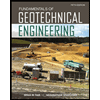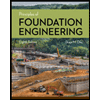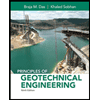2. For a 50-story (above the ground) building with 4 floors of basement (D= 12.0 m), the average floor weight (including dead load and live load) is 15 kN/m². Assume the height of each floor of the basement is 3 m (including the thickness of the slab). The mat foundation (with a dimension of 30 m × 20 m) is situated in a thick clay layer with a saturated unit weight of 18 kN/m³ and an undrained shear strength (Su) of 30 kPa (remains constant with depth). In addition, the clay has an effective friction angle ' = 28° while c' = 0. Answer the following questions: (A) Would the mat foundation of the building be fully compensated? (B) The factor of safety for bearing capacity in a short-term condition. (C) The factor of safety for bearing capacity in a long-term condition. Use FS = Qu(net)/q, where the generalized bearing capacity equation is given by qu(net) = c'NcFcsFca Fci + YDƒNqFqsFqdFqi + 0.5yBNy FysFya Fyi - YDf and q is the net average applied pressure on soil. Figure, Tables, and Equations: qu 14c.(1 B 5.14c1+0.195 52) (1+0.42%)+ D +9 (10.11) B D (10.12) B Qu(net) quq = 5.14c, 1+ 0.195- = (1+ 952)(1 +0.42%) Qall(net) qu(net) FS = 713 CM (1 D 1.713c 10.195 1+0.4- (10.13) B t For FS=3 General bearing capacity equation: qu = c'NcFcs FcdFci+q'NqFqsFqaFqi + 0.5yBNy FysFya Fyi Shape factors by De Beer (1970) BN Fcs = 1 + (-) (~) L'N Depth factors by Hansen (1970) Inclination factors by Meyerhof (1963) and Hanna and Meyerhof (1981) Fcd = 1+0.4(- 2.4(금) Fci = Fqi = (1- B = F-1+tan o' B Fqd = 1 + 2 tan o' (1 − sin o') 2. Fyd = 1 Df β Fyi = (1- B Fys = 1 -0.4(+) 900)2 Bearing capacity factors Nc, Ng, Ny TABLE 6.2 Bearing Capacity Factors From Eqs. (6.30), (6.29), and (6.31) (Continued) No Na Ny $' No Na Ny 22 16.88 7.82 7.13 37 55.63 42.92 66.19 TABLE 6.2 Bearing Capacity Factors From Eqs. (6.30), (6.29), and (6.31) 23 18.05 8.66 8.20 38 61.35 48.93 78.03 24 19.32 9.60 9.44 39 67.87 55.96 92.25 $' Ne Na Ny $' Ne N₁ Ny 25 20.72 10.66 10.88 40 75.31 64.20 109.41 0 5.14 1.00 0.00 11 8.80 2.71 1.44 26 22.25 11.85 12.54 41 83.86 73.90 130.22 1 5.38 1.09 0.07 12 9.28 2.97 1.69 27 23.94 13.20 14.47 42 93.71 85.38 155.55 2 5.63 1.20 0.15 13 9.81 3.26 1.97 28 25.80 14.72 16.72 43 105.11 99.02 186.54 3 5.90 1.31 0.24 14 10.37 3.59 2.29 29 27.86 16.44 19.34 44 118.37 115.31 224.64 4 6.19 1.43 0.34 15 10.98 3.94 2.65 30 30.14 18.40 22.40 45 133.88 134.88 271.76 5 6.49 1.57 0.45 16 11.63 4.34 3.06 31 32.67 20.63 25.99 46 152.10 158.51 6 6.81 1.72 0.57 17 12.34 330.35 4.77 3.53 32 35.49 23.18 30.22 47 173.64 187.21 403.67 7 7.16 1.88 0.71 18 13.10 5.26 4.07 33 38.64 26.09 35.19 48 199.26 222.31 496.01 8 7.53 2.06 0.86 19 13.93 5.80 4.68 34 42.16 29.44 41.06 49 229.93 265.51 613.16 9 7.92 2.25 1.03 20 14.83 6.40 5.39 35 46.12 33.30 48.03 50 266.89 319.07 762.89 10 8.35 2.47 1.22 21 15.82 7.07 6.20 36 50.59 37.75 56.31 (continued)
2. For a 50-story (above the ground) building with 4 floors of basement (D= 12.0 m), the average floor weight (including dead load and live load) is 15 kN/m². Assume the height of each floor of the basement is 3 m (including the thickness of the slab). The mat foundation (with a dimension of 30 m × 20 m) is situated in a thick clay layer with a saturated unit weight of 18 kN/m³ and an undrained shear strength (Su) of 30 kPa (remains constant with depth). In addition, the clay has an effective friction angle ' = 28° while c' = 0. Answer the following questions: (A) Would the mat foundation of the building be fully compensated? (B) The factor of safety for bearing capacity in a short-term condition. (C) The factor of safety for bearing capacity in a long-term condition. Use FS = Qu(net)/q, where the generalized bearing capacity equation is given by qu(net) = c'NcFcsFca Fci + YDƒNqFqsFqdFqi + 0.5yBNy FysFya Fyi - YDf and q is the net average applied pressure on soil. Figure, Tables, and Equations: qu 14c.(1 B 5.14c1+0.195 52) (1+0.42%)+ D +9 (10.11) B D (10.12) B Qu(net) quq = 5.14c, 1+ 0.195- = (1+ 952)(1 +0.42%) Qall(net) qu(net) FS = 713 CM (1 D 1.713c 10.195 1+0.4- (10.13) B t For FS=3 General bearing capacity equation: qu = c'NcFcs FcdFci+q'NqFqsFqaFqi + 0.5yBNy FysFya Fyi Shape factors by De Beer (1970) BN Fcs = 1 + (-) (~) L'N Depth factors by Hansen (1970) Inclination factors by Meyerhof (1963) and Hanna and Meyerhof (1981) Fcd = 1+0.4(- 2.4(금) Fci = Fqi = (1- B = F-1+tan o' B Fqd = 1 + 2 tan o' (1 − sin o') 2. Fyd = 1 Df β Fyi = (1- B Fys = 1 -0.4(+) 900)2 Bearing capacity factors Nc, Ng, Ny TABLE 6.2 Bearing Capacity Factors From Eqs. (6.30), (6.29), and (6.31) (Continued) No Na Ny $' No Na Ny 22 16.88 7.82 7.13 37 55.63 42.92 66.19 TABLE 6.2 Bearing Capacity Factors From Eqs. (6.30), (6.29), and (6.31) 23 18.05 8.66 8.20 38 61.35 48.93 78.03 24 19.32 9.60 9.44 39 67.87 55.96 92.25 $' Ne Na Ny $' Ne N₁ Ny 25 20.72 10.66 10.88 40 75.31 64.20 109.41 0 5.14 1.00 0.00 11 8.80 2.71 1.44 26 22.25 11.85 12.54 41 83.86 73.90 130.22 1 5.38 1.09 0.07 12 9.28 2.97 1.69 27 23.94 13.20 14.47 42 93.71 85.38 155.55 2 5.63 1.20 0.15 13 9.81 3.26 1.97 28 25.80 14.72 16.72 43 105.11 99.02 186.54 3 5.90 1.31 0.24 14 10.37 3.59 2.29 29 27.86 16.44 19.34 44 118.37 115.31 224.64 4 6.19 1.43 0.34 15 10.98 3.94 2.65 30 30.14 18.40 22.40 45 133.88 134.88 271.76 5 6.49 1.57 0.45 16 11.63 4.34 3.06 31 32.67 20.63 25.99 46 152.10 158.51 6 6.81 1.72 0.57 17 12.34 330.35 4.77 3.53 32 35.49 23.18 30.22 47 173.64 187.21 403.67 7 7.16 1.88 0.71 18 13.10 5.26 4.07 33 38.64 26.09 35.19 48 199.26 222.31 496.01 8 7.53 2.06 0.86 19 13.93 5.80 4.68 34 42.16 29.44 41.06 49 229.93 265.51 613.16 9 7.92 2.25 1.03 20 14.83 6.40 5.39 35 46.12 33.30 48.03 50 266.89 319.07 762.89 10 8.35 2.47 1.22 21 15.82 7.07 6.20 36 50.59 37.75 56.31 (continued)
Fundamentals of Geotechnical Engineering (MindTap Course List)
5th Edition
ISBN:9781305635180
Author:Braja M. Das, Nagaratnam Sivakugan
Publisher:Braja M. Das, Nagaratnam Sivakugan
Chapter17: Settlement Of Shallow Foundations
Section: Chapter Questions
Problem 17.5P
Related questions
Question
I need detailed help solving this exercise from Foundation Engineering.
Step by step, please.

Transcribed Image Text:2. For a 50-story (above the ground) building with 4 floors of basement (D= 12.0 m), the average floor weight (including
dead load and live load) is 15 kN/m². Assume the height of each floor of the basement is 3 m (including the thickness
of the slab). The mat foundation (with a dimension of 30 m × 20 m) is situated in a thick clay layer with a saturated unit
weight of 18 kN/m³ and an undrained shear strength (Su) of 30 kPa (remains constant with depth). In addition, the clay
has an effective friction angle ' = 28° while c' = 0. Answer the following questions: (A) Would the mat foundation of
the building be fully compensated? (B) The factor of safety for bearing capacity in a short-term condition. (C) The factor
of safety for bearing capacity in a long-term condition. Use FS = Qu(net)/q, where the generalized bearing capacity
equation is given by qu(net) = c'NcFcsFca Fci + YDƒNqFqsFqdFqi + 0.5yBNy FysFya Fyi - YDf and q is the net average
applied pressure on soil.
Figure, Tables, and Equations:
qu
14c.(1
B
5.14c1+0.195
52) (1+0.42%)+
D
+9
(10.11)
B
D
(10.12)
B
Qu(net) quq = 5.14c, 1+ 0.195-
= (1+ 952)(1 +0.42%)
Qall(net)
qu(net)
FS
=
713 CM (1
D
1.713c 10.195 1+0.4-
(10.13)
B
t
For FS=3
General bearing capacity equation: qu = c'NcFcs FcdFci+q'NqFqsFqaFqi + 0.5yBNy FysFya Fyi
Shape factors by De Beer (1970)
BN
Fcs = 1 + (-) (~)
L'N
Depth factors by Hansen (1970)
Inclination factors by Meyerhof (1963)
and Hanna and Meyerhof (1981)
Fcd
=
1+0.4(-
2.4(금)
Fci = Fqi = (1-
B
=
F-1+tan
o'
B
Fqd = 1 + 2 tan o' (1 − sin o') 2.
Fyd = 1
Df
β
Fyi = (1-
B
Fys = 1 -0.4(+)
900)2
Bearing capacity factors Nc, Ng, Ny
TABLE 6.2 Bearing Capacity Factors From Eqs. (6.30), (6.29), and (6.31) (Continued)
No
Na
Ny
$'
No
Na
Ny
22
16.88
7.82
7.13
37
55.63
42.92
66.19
TABLE 6.2 Bearing Capacity Factors From Eqs. (6.30), (6.29), and (6.31)
23
18.05
8.66
8.20
38
61.35
48.93
78.03
24
19.32
9.60
9.44
39
67.87
55.96
92.25
$'
Ne
Na
Ny
$'
Ne
N₁
Ny
25
20.72
10.66
10.88
40
75.31
64.20
109.41
0
5.14
1.00
0.00
11
8.80
2.71
1.44
26
22.25
11.85
12.54
41
83.86
73.90
130.22
1
5.38
1.09
0.07
12
9.28
2.97
1.69
27
23.94
13.20
14.47
42
93.71
85.38
155.55
2
5.63
1.20
0.15
13
9.81
3.26
1.97
28
25.80
14.72
16.72
43
105.11
99.02
186.54
3
5.90
1.31
0.24
14
10.37
3.59
2.29
29
27.86
16.44
19.34
44
118.37
115.31
224.64
4
6.19
1.43
0.34
15
10.98
3.94
2.65
30
30.14
18.40
22.40
45
133.88
134.88
271.76
5
6.49
1.57
0.45
16
11.63
4.34
3.06
31
32.67
20.63
25.99
46
152.10
158.51
6
6.81
1.72
0.57
17
12.34
330.35
4.77
3.53
32
35.49
23.18
30.22
47
173.64
187.21
403.67
7
7.16
1.88
0.71
18
13.10
5.26
4.07
33
38.64
26.09
35.19
48
199.26
222.31
496.01
8
7.53
2.06
0.86
19
13.93
5.80
4.68
34
42.16
29.44
41.06
49
229.93
265.51
613.16
9
7.92
2.25
1.03
20
14.83
6.40
5.39
35
46.12
33.30
48.03
50
266.89
319.07
762.89
10
8.35
2.47
1.22
21
15.82
7.07
6.20
36
50.59
37.75
56.31
(continued)
Expert Solution
This question has been solved!
Explore an expertly crafted, step-by-step solution for a thorough understanding of key concepts.
Step by step
Solved in 2 steps

Recommended textbooks for you

Fundamentals of Geotechnical Engineering (MindTap…
Civil Engineering
ISBN:
9781305635180
Author:
Braja M. Das, Nagaratnam Sivakugan
Publisher:
Cengage Learning

Principles of Foundation Engineering (MindTap Cou…
Civil Engineering
ISBN:
9781337705028
Author:
Braja M. Das, Nagaratnam Sivakugan
Publisher:
Cengage Learning

Principles of Foundation Engineering (MindTap Cou…
Civil Engineering
ISBN:
9781305081550
Author:
Braja M. Das
Publisher:
Cengage Learning

Fundamentals of Geotechnical Engineering (MindTap…
Civil Engineering
ISBN:
9781305635180
Author:
Braja M. Das, Nagaratnam Sivakugan
Publisher:
Cengage Learning

Principles of Foundation Engineering (MindTap Cou…
Civil Engineering
ISBN:
9781337705028
Author:
Braja M. Das, Nagaratnam Sivakugan
Publisher:
Cengage Learning

Principles of Foundation Engineering (MindTap Cou…
Civil Engineering
ISBN:
9781305081550
Author:
Braja M. Das
Publisher:
Cengage Learning

Principles of Geotechnical Engineering (MindTap C…
Civil Engineering
ISBN:
9781305970939
Author:
Braja M. Das, Khaled Sobhan
Publisher:
Cengage Learning